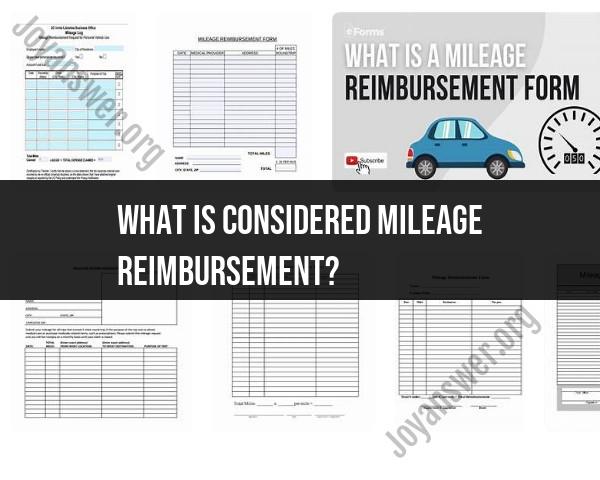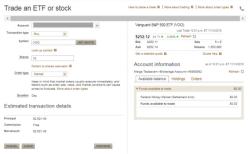What is considered mileage reimbursement?
Mileage reimbursement refers to the compensation or payment provided to individuals, typically employees or self-employed workers, for the use of their personal vehicles for work-related travel. This reimbursement is intended to cover the costs associated with operating a personal vehicle, such as gasoline, maintenance, insurance, and wear and tear. Mileage reimbursement is a common practice in many industries and is often used to encourage employees to use their vehicles for business purposes.
Key points to understand about mileage reimbursement include:
Rate: Reimbursement rates are typically set by the employer or organization and are based on a per-mile rate. This rate can vary and is intended to cover the variable costs associated with driving, such as fuel and maintenance. The rate is often based on the IRS standard mileage rate, which is updated annually.
Eligible Trips: Mileage reimbursement is typically provided for work-related trips, including travel to client meetings, job sites, business-related errands, or other tasks that require the use of a personal vehicle.
Documentation: To receive mileage reimbursement, employees are often required to keep detailed records of their mileage, including the starting and ending locations, the purpose of the trip, and the number of miles driven. This documentation is important for accounting and tax purposes.
Tax Implications: Mileage reimbursement is not considered taxable income to the recipient, as it is meant to cover expenses related to work. However, it's important to keep accurate records for tax reporting and to ensure compliance with tax regulations.
Limits and Policies: Employers may set limits on the amount of mileage that can be reimbursed or have specific policies in place for mileage reimbursement. It's essential for employees to be aware of these policies and follow them.
Self-Employed and Contractors: Self-employed individuals and contractors may also be eligible for mileage reimbursement if they use their vehicles for business purposes. In this case, they can often deduct their mileage expenses as a business expense when filing taxes.
Expense Reports: Employees are typically required to submit mileage expense reports to their employer for reimbursement. These reports should include all relevant details, such as the date of the trip, locations visited, and total mileage driven.
Fair Reimbursement: Mileage reimbursement should aim to provide fair compensation for the use of personal vehicles. Employers often review their reimbursement rates regularly to ensure they are keeping pace with the actual costs of driving.
It's important to note that the specific rules and regulations related to mileage reimbursement can vary by location and industry. Employees and self-employed individuals should be familiar with their organization's policies and local laws regarding mileage reimbursement to ensure compliance and fair compensation for their work-related travel.
What Is Considered Mileage Reimbursement?
Mileage reimbursement is a form of compensation that businesses and employers provide to employees for the use of their personal vehicles for business or work-related purposes. Mileage reimbursement is typically calculated based on the standard mileage rate set by the Internal Revenue Service (IRS).
Defining Mileage Reimbursement in Business and Employment
In business, mileage reimbursement is often used to compensate sales representatives, delivery drivers, and other employees who regularly use their personal vehicles for work. Mileage reimbursement can also be used to compensate employees for travel expenses incurred while attending conferences or training programs.
In employment, mileage reimbursement is typically used to compensate employees who travel for business purposes, such as sales representatives or delivery drivers. Mileage reimbursement may also be used to compensate employees for travel expenses incurred while commuting to and from work, but this is less common.
Establishing Fair Mileage Reimbursement Practices
When establishing mileage reimbursement practices, it is important to consider the following factors:
- The standard mileage rate set by the IRS: The IRS sets a standard mileage rate each year to be used for business travel. This rate is based on the estimated cost of operating a vehicle, including fuel, depreciation, and maintenance.
- The actual cost of operating a vehicle: The actual cost of operating a vehicle may vary depending on the type of vehicle, the distance traveled, and the fuel efficiency of the vehicle.
- The employee's needs: When setting a mileage reimbursement rate, it is important to consider the needs of the employee. For example, employees who travel long distances or who drive less fuel-efficient vehicles may need to be reimbursed at a higher rate.
Legal and Ethical Considerations in Mileage Reimbursement
There are a few legal and ethical considerations to keep in mind when reimbursing employees for mileage.
- Legal requirements: Employers must comply with all applicable laws and regulations when reimbursing employees for mileage. For example, under the Fair Labor Standards Act, employers are required to reimburse employees for mileage at a rate that is at least equal to the standard mileage rate set by the IRS.
- Ethical considerations: Employers should also consider ethical considerations when reimbursing employees for mileage. For example, it is unethical for employers to reimburse employees at a rate that is lower than the actual cost of operating a vehicle.
Customizing Mileage Reimbursement Policies
Employers can customize their mileage reimbursement policies to meet their specific needs. For example, employers may choose to reimburse employees at a rate that is higher than the standard mileage rate set by the IRS. Employers may also choose to reimburse employees for other travel expenses, such as parking fees and tolls.
When customizing a mileage reimbursement policy, it is important to be consistent and to communicate the policy to employees in a clear and concise manner.
Here are some additional tips for customizing a mileage reimbursement policy:
- Consider the type of business: The type of business will often dictate the needs of employees and the type of mileage reimbursement policy that is appropriate. For example, a business with a large sales force may need a different mileage reimbursement policy than a business with mostly office workers.
- Set clear and concise guidelines: The mileage reimbursement policy should be clearly written and easy for employees to understand. The policy should outline the following:
- Who is eligible for mileage reimbursement?
- What expenses are eligible for reimbursement?
- How is the mileage reimbursement rate calculated?
- What documentation is required for reimbursement?
- Communicate the policy to employees: The mileage reimbursement policy should be communicated to all employees in a clear and concise manner. The policy should be provided to employees in writing and should be posted in a conspicuous location in the workplace.
- Review and update the policy regularly: The mileage reimbursement policy should be reviewed and updated regularly to ensure that it is still meeting the needs of the business and the employees.












